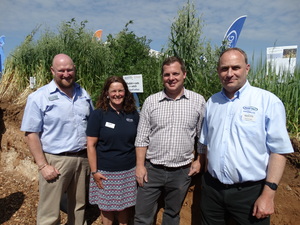NIAB is delighted to be part of a new initiative for Soil Health, launched today (13 June) at the Cereals Event in Cambridgeshire. NIAB's Head of Farming Systems, Dr Elizabeth Stockdale is pleased to be playing a key role in developing the new initiative to increase understanding and improve the health of soils across UK farmland for generations to come.
The active partnership of organisations from across the agricultural sector is building on the existing knowledge and skills base bringing together information and best practice so that new approaches can be developed to support improved soil husbandry by farmers and growers whether of combinable crops, field vegetables, fruit or grass and forage crops.
NIAB has eight soil experts delivering a wide programme of research and training on soil function, and is actively involved in providing training on soil management through its ARTIS programme. Working with The Morley Agricultural Foundation, NIAB is running long-term trials testing the impacts on soil fertility, soil structure and overall soil health of organic matter additions, cultivations and rotations. In addition NIAB is actively leading research on root-soil interactions, soil biological indicators and the role of soil’s microbiome in plant health.
AIC PRESS RELEASE
TAKING THE INITIATIVE TO DELIVER SOIL HEALTH FOR UK AGRICULTURAL SOILS
With wide backing, a new initiative for Soil Health is bringing together scientists, academics, industry farm advisers and farming bodies to take a long-term approach to understanding and improving the health of soils across UK farmland for generations to come.
The new body is being formed as a direct response to the Government’s ambition that ‘all England’s soils should be managed sustainably by 2030, supporting profitable and productive farming, and underpinning targets for clean water and air…’ (Defra 25 year environment plan)
The new initiative aims to work with all devolved governments to deliver this aspiration across the UK. Working closely with Government, through voluntary actions the approach will help farmers and growers to pass on soils under agricultural management to the next generation protected and enhanced.
Initial backing has come from a range of research and advisory organisations, agrisupply businesses and soil laboratories as well farmers and growers. (Full list- see Notes for Editors). However, the partnership is keen expand to ensure as wide a representation of interests and disciplines as possible.
Developed over a series of industry gatherings, the initiative recognises that much is already being done to address the issues of soil health from research to practical field demonstrations. This renewed emphasis on soils will continue to build on the existing knowledge and skills base bringing together information, best practice and develop new approaches. Identifying knowledge gaps and encouraging research into such areas will be an important part of the early work.
Elizabeth Stockdale of NIAB, a soils specialist closely involved in the partnership comments: “From visits to innovative farmers and AHDB Monitor Farms, I have seen lots of research in action to deliver site-specific husbandry that treats soils as a living part of the farming system. This initiative is the opportunity to bring together the best science and practice to improve soil health.”
Work will also be undertaken to establish the characteristics for soil health and on-farm approaches to monitor them over time. While some measures, such as earthworms, can change quite rapidly, others such as soil organic matter change slowly, often over many years. Therefore, those involved are committed to a long-term approach to measuring soil health improvement.
Dave Freeman, Chair of the Professional Agricultural Analysis Group (PAAG) says: “We want to focus on defining measures that help farmers understand soil health. As all soils differ, an ability to measure key factors is essential for good management and achieving improvements over time.”
On-farm advice will play a critical part. There will be no one-size fits all blueprint as improving soil health will be, in part, built on existing practice, soil type, climate, etc. Whether growing combinable crops, field vegetables or grass and forage crops there will be options to enhance productivity and soil health. The new initiative seeks to help farmers and growers understand how to manage soils for both improved productivity and increased sustainability, based on healthy soils.
Through initial meetings, the partnership recognised that work to address soil health is quite extensive. However, to date all this effort has lacked coordination. Working with the farming community, the emerging initiative will look to deliver a consistent and coordinated approach to improving soil health across the UK.
In the coming months, partners will promote the importance of measuring soil physical condition and topsoil organic matter alongside routine indicators for improved nutrient management. Case studies of best practice that already exist on farm will be developed alongside clear evidence that enables the agricultural industry to improve soil husbandry to support profitable and productive farming.
ENDS
Further information:
Dave Freeman, Policy Manager, AIC 01733 385240
dave.freeman [at] agindustries.org.uk
Elizabeth Stockdale, Head of Farming Systems Research, NIAB 07957 342401
elizabeth.stockdale [at] niab.com
NOTES FOR EDITORS
Organisations that agreed to the basic tenets of the emerging initiative on Soil Health so far are listed below. Other companies and organisations are expected to join in and will be welcomed.
• ADAS
• Agri-Food and Biosciences Institute
• Agricultural Industries Confederation
• Agrii
• Anglian Water
• BASIS
• British Grassland Society
• British Society of Soil Science
• East of England Agricultural Society
• Fera Science Ltd
• Frontier Agriculture
• G’s
• Grantham Centre for Sustainable Futures, University of Sheffield
• GWCT
• Hill Court Farm Research Ltd
• HL Hutchinson
• Innovation for Agriculture (Royal Agricultural Society of England)
• Manor Farm Feeds (Owston) Ltd
• National Trust
• Natural England (Catchment Sensitive Farming project)
• NIAB
• NRM Laboratories (Cawood Scientific)
• Organic Farmers and Growers CIC
• RH & PA Harvey (Farm)
• SRUC
• Sustainable Soils Alliance
• The James Hutton Institute
• Yara UK

